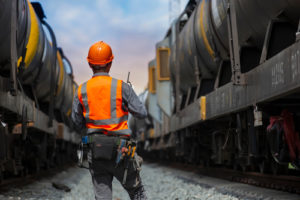
Aspiring freight rail employees could virtually complete certain training requirements under legislation sponsored on July 29 by U.S. Rep. Troy Balderson (R-OH) that aims to reduce bureaucratic red tape and streamline entry into the industry’s workforce.
Currently, existing federal regulations require applicants to enroll in in-person classroom instruction that may be far away from their homes and employers, according to a bill summary provided by Rep. Balderson’s office, which noted that classroom-based instruction then is only made available when a large enough cohort of new hires is available to fill a classroom.
In turn, this presents a barrier to entry into the freight rail industry and worsens the ongoing supply chain crisis, the summary says.
“This is yet another example of the ways government bureaucracy is making the ongoing supply chain problems worse, not better,” Rep. Balderson said. “Modernizing these requirements should be a no-brainer. We must take every possible step to streamline regulatory barriers that are worsening labor shortages in the freight rail industry, without compromising safety, standards or effectiveness.”
The Rail Employee Training Modernization Act, H.R. 8598, would direct the U.S. Transportation Secretary to issue certain regulations to define the term “classroom” in the Code of Federal Regulations, according to the congressional record bill summary.
“Typically, it can take up to six months for a newly hired conductor to complete the classroom, simulator and on-the-job training before they can begin work in the field. Rep. Balderson’s common-sense legislation will help accelerate the process by allowing the classroom session to go virtual,” said Ian Jefferies, president and CEO of the American Association of Railroads. “At a time when railroads are doing everything possible to get new railroaders safely into the field, this smart solution would go a long way to helping the industry reach that goal without compromising safety.”
H.R. 8598 has been referred to the U.S. House Transportation and Infrastructure Subcommittee on Railroads, Pipelines, and Hazardous Materials.



